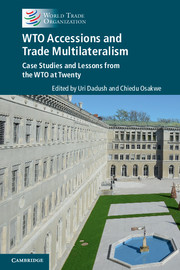Book contents
- Frontmatter
- Dedication
- Contents
- List of contributors
- Foreword
- Acknowledgements
- List of abbreviations
- Editors' note
- PART I WTO accessions, the trading system and the global economy
- PART II Overview: systemic outcomes from accessions
- PART III Members’ perspectives on accession negotiations
- Original members
- 12 WTO accessions from a member's perspective: safeguarding the rules-based system
- 13 WTO accessions: a market access perspective on growth – the approach of the European Union
- 14 WTO accessions: a rules perspective on growth – the approach of the European Union
- 15 WTO accession negotiations: trends and results in agriculture plurilaterals
- Article XII members
- PART IV Working party chairpersons’ perspectives on accession negotiations
- PART V Salient features inWTOAccession Protocols
- PART VI Conclusion
- Annex: Contributor biographies
- Index
- Plate section
13 - WTO accessions: a market access perspective on growth – the approach of the European Union
from Original members
Published online by Cambridge University Press: 05 November 2015
- Frontmatter
- Dedication
- Contents
- List of contributors
- Foreword
- Acknowledgements
- List of abbreviations
- Editors' note
- PART I WTO accessions, the trading system and the global economy
- PART II Overview: systemic outcomes from accessions
- PART III Members’ perspectives on accession negotiations
- Original members
- 12 WTO accessions from a member's perspective: safeguarding the rules-based system
- 13 WTO accessions: a market access perspective on growth – the approach of the European Union
- 14 WTO accessions: a rules perspective on growth – the approach of the European Union
- 15 WTO accession negotiations: trends and results in agriculture plurilaterals
- Article XII members
- PART IV Working party chairpersons’ perspectives on accession negotiations
- PART V Salient features inWTOAccession Protocols
- PART VI Conclusion
- Annex: Contributor biographies
- Index
- Plate section
Summary
ABSTRACT
A strong multilateral trading system is vital to developing countries' long-term interests both for its rulebook and for the market access that it guarantees in all key markets. Markets are increasingly located in developing countries. Indeed, for the first time in recent history, South–South trade outweighs North–South trade, even though barriers to South–South trade are much more significant than those to developed countries' markets. Through their WTO accession, acceding economies can reap the benefits of more and better access to most world markets – that of the European Union being among the biggest.
Market access is at the heart of European Union (EU) trade policy. Indeed, according to Article 206 of the Treaty on the Functioning of the European Union (TFEU),
by establishing a customs union in accordance with Articles 28 to 32, the Union shall contribute, in the common interest, to the harmonious development of world trade, the progressive abolition of restrictions on international trade and on foreign direct investment (FDI), and the lowering of customs and other barriers.
Therefore, in (multilateral, plurilateral and bilateral) trade negotiations, the European Union seeks to improve and secure market access to third-country markets. This is the case in WTO accessions too.
Each accession being unique, there is no one-size-fits-all market access approach in the negotiations. As a result of the EU trade policy-making process, the European Union requests that flexibilities and targets be defined on a case-by-case basis while taking into account some general considerations.
This chapter attempts to: (i) shed some light on general considerations that play a role in the market access approaches followed by the European Union in WTO accessions; (ii) describe the EU trade policy-making process; and (iii) identify some trends followed in the accession negotiations in the areas of trade in goods and services.
General considerations in WTO accessions
An ambitious market access agenda
Accessing markets outside the European Union is crucial for jobs and growth within the European Union. An open and fair international trading system is one of the foundations of Europe's competitiveness. Addressing barriers to EU exports in other countries accounts for the bulk of the potential to improve the competitive position of EU industry. Its leading trading partners are less open than the European Union, sometimes significantly so.
- Type
- Chapter
- Information
- WTO Accessions and Trade MultilateralismCase Studies and Lessons from the WTO at Twenty, pp. 401 - 411Publisher: Cambridge University PressPrint publication year: 2015
- 2
- Cited by



